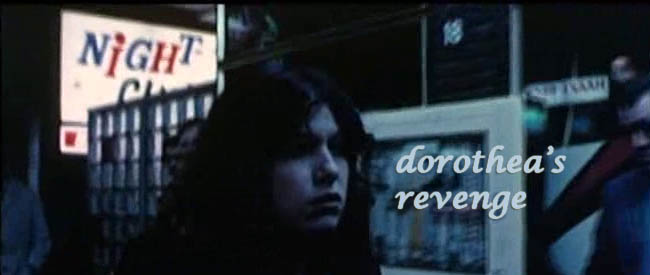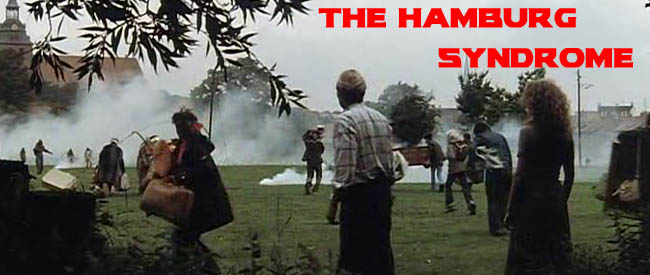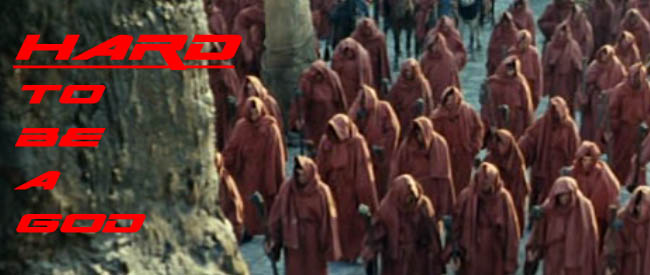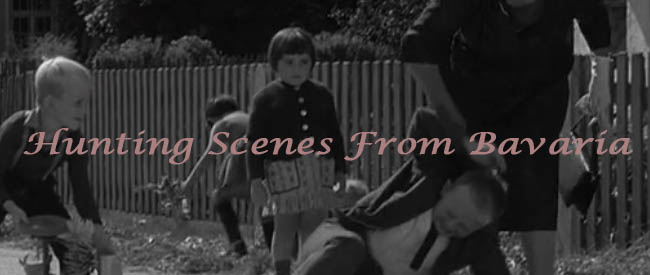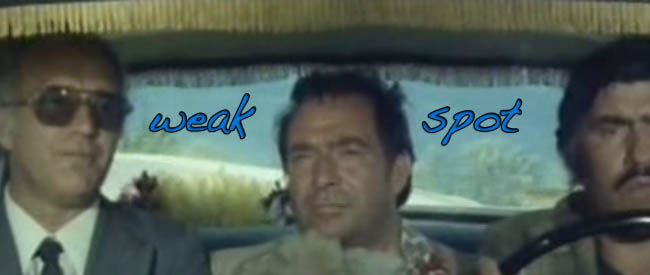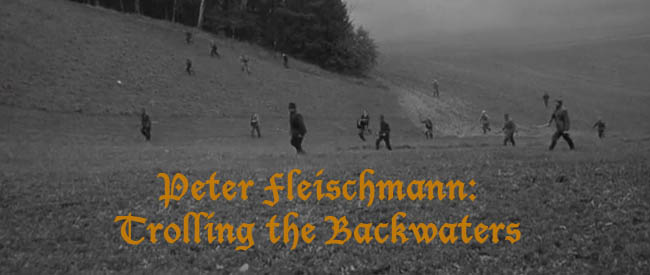
Hardly anyone seems to have heard of Peter Fleischmann. This in spite of the fact that from 1969 to 1989 he made half a dozen features with some of the most celebrated talents of French and German cinema. After an education at the Institut des Hautes Études Cinématographiques and a discipleship with Jacques Rozier (one of the lesser-known names of the French New Wave), Fleischmann recruited a handful of actors from the stables of his New German Cinema companions and shot his first feature, HUNTING SCENES FROM BAVARIA. Later in the same year, he and Volker Schlöndorff started Hallelujah Film, an independent production company that would go on to produce most of Fleischmann’s own films, as well as films by Schlöndorff and Louis Malle. During his motley career, Fleischmann hopped adroitly between genres, from formally restrained play adaptations to buddy cop movies, soft-core pornography, and medieval sci-fi epics. Despite collaborating with the likes of Jean-Claude Carrière, Hanna Schygulla, Alain Derobe, Michel Piccoli, and Fernando Arrabal, Fleischmann has not become a household name even in cinephile circles in this country. This series is Spectacle’s attempt to help bring more attention to his stylistically eclectic, pan-European body of work than it has thus far received.
DOROTHEA’S REVENGE
aka Dorotheas Rache
Dir. Peter Fleischmann, 1974
West Germany/France, 92 min.
In German with English subtitles
SUNDAY, APRIL 5 – 7:30 PM
FRIDAY, APRIL 24 – 10 PM
THURSDAY, APRIL 30 – 7:30 PM
The shortlist of fans for Fleischmann’s sex satire is nothing to scoff at. Among its most ardent fans were several household names of European arthouse: Bernardo Bertolucci, Pier Paolo Pasolini, and Claude Chabrol. Then there’s the post-surrealist group the Panic Movement (comprised of Fernando Arrabal, Alejandro Jodorowsky, and Roland Topor) who liked the film so much that they even decided to bestow upon the film a little reward—the “prix du group panic.”
Dorothea is a 16-year old girl from Hamburg, brought up in a typical, bourgeois family. This changes one day when she comes down for breakfast and her parents find her completely disheveled—a Martian has just raped her. So begins Dorothea’s sex odyssey, as she seeks to understand her body and its various uses in an incereasingly consumerist society. The key to the film is that she approaches these question of sex with every ounce of naiveté common to a young girl. She tries to make softcore porn with her friends, and when that doesn’t work, she gives prostution a turn, and so on and so forth. There’s seemingly no end to this excursion.
Fleischmann proved that he could produce biting political commentary within the confines of fiction in HUNTING SCENES FROM BAVARIA. Eschewing the traditional narrative scaffolding and riding on the back of a sex wave in European cinema—Vilgot Sjöman’s I AM CURIOUS (YELLOW), Dušan Makavejev’s WR: MYSTERIES OF THE ORGANISM, and the films of Walerian Borowczyk are key predecessors—Fleischmann enlists a slew of experimental techniques, like having the characters routinely break the fourth wall and construing a hodge podge of stylistically contradictory scenes, from conversations with Christ on the cross to BDSM rituals. Moreover, humor is a constant presence, something that can’t be said for many of the period’s Eurotrash sexploitations. In one scene, there’s a shot of three men getting an erection, played to brassy, courtly music. It’s the promise of entertainment that gives an otherwise powerful political satire it’s enduring glow.
THE HAMBURG SYNDROME
aka Die Hamburger Krankheit
Dir. Peter Fleischmann, 1979
West Germany/France, 117 min.
In German with English subtitles
TUESDAY, APRIL 7 – 7:30 PM
SATURDAY, APRIL 25 – 7:30 PM
TUESDAY, APRIL 28 – 10 PM
The film opens with a conference—a euphoric call to arms—on human longevity. A speaker bellows to a tired crowd, “Nobody denies that death is something natural, but mankind has proven more than once that it controls nature!” Meanwhile, a contagious disease spreads through the streets of Hamburg, leaving its victims in the fetal position.
Helmut Griem (THE DAMNED, THE DESERT OF THE TARTARS) plays the charismatic Professor Sebastian Ellerwein. While the bureaucrats are quick to pull the trigger on some kind of grand scheme to assure the masses, Ellerwein cautions against fighting what one doesn’t understand. Yet he’s alone in this opinion. Pandemonium ensues. The State rushes in to impose some semblance of order, desperate to pin the virus on anyone it can. The citizens react like mad hogs and turn on each other as earthquakes shake the city and men in white jumpers snag beautiful women off the streets.The mechanism of scapegoating thematized in HUNTING SCENES FROM BAVARIA returns on a vaster scale.
Jean Michel Jarre’s synth-laden soundtrack meshes seamlessly with this frenzied dystopia, and the cast is rounded out by the incorrigible, wheelchair-bound Fernando Arrabal in his last film appearance. The false promises of modernist utopian schemes have rarely been as effectively exposed as they are in THE HAMBURG SYNDROME.
HARD TO BE A GOD
aka Es ist nicht leicht ein Gott zu sein
Dir. Peter Fleischmann, 1989
West Germany/France/Switzerland/USSR, 119 min.
In German with English subtitles
WEDNESDAY, APRIL 1 – 7:30 PM
MONDAY, APRIL 6 – 10 PM
SUNDAY, APRIL 26 – 7:30 PM
Featuring “I Offer Unto Thee Something Beautiful, Something Burnt” by Antoni Maiovvi from the “Battlestar Transreplica” EP released on Seed Records.
Following the recent release of Aleksei German’s long-awaited, grimly visceral masterpiece and testament, HARD TO BE A GOD, Spectacle is proud to present Peter Fleischmann’s much less lauded, sometimes heavily ridiculed, adaptation of the same source novel. With a broader color palette, a more intelligible narrative, a more merciful runtime, and bigger hair, Fleischmann’s version is more likely to draw comparisons to HIGHLANDER and CONAN THE BARBARIAN than to THE COLOR OF POMEGRANATES.
On a distant planet with a human civilization centuries behind that of Earth, the warrior Rumata—who is really Anton, an earthling scientist in disguise—is forced to assume the throne of the city-sate of Arkanar, which has just been vacated by King Pierre Clémenti (LES IDOLES, THE YEAR OF THE CANNIBALS, PIGSTY). Anton is on a quest to reach the city of Irukan to find the fabled scholar Budach, who he believes can single-handedly launch a Renaissance and pull this violent world out of its dark ages.
Co-written by Jean-Claude Carrière (frequent collaborator of Pierre Étaix and Luis Buñuel and screenwriter of THE TIN DRUM) and featuring Werner Herzog as a scheming merchant, Fleischmann’s HARD TO BE A GOD offers a lusher, giddier rendition of the legendary Strugatsky brothers’ novel.
Because of the unforeseen success of the recent premiere run of Aleksei German’s version of HARD TO BE A GOD, Anthology Film Archives is bringing it back for another week-long run, Friday, April 23 – Tuesday, April 28. If you didn’t get a chance to experience it in January, make sure you don’t miss it this time around. For more information, visit Anthology’s Premieres page.
HUNTING SCENES FROM BAVARIA
aka Jagdszenen aus Niederbayern
Dir. Peter Fleischmann, 1969
West Germany, 88 min.
In Lower Bavarian with English subtitles
SATURDAY, APRIL 4 – 10 PM
FRIDAY, APRIL 17 – 7:30 PM
WEDNESDAY, APRIL 22 – 7:30 PM
Based on a play by Lower Bavarian dramatist Martin Sperr, Hunting Scenes from Bavaria forces Angela Winkler (THE LOST HONOR OF KATHARINA BLUM, THE LEFT-HANDED WOMAN) and Fassbinder-favorite Hanna Schygulla to put on thick, rural south-German accents and tosses them into a maelstrom of provincial resentment and homophobia. These yokels are so nasty in so many ways that the federal state of Bavaria should have sued Fleischmann for slander.
When young farmhand Abram (Martin Sperr) comes back to town after a long hiatus, the scowling villagers rev up their malicious-gossip-machine. Rumors start spreading about Abram’s stint in prison and his newfound taste for men, until life becomes intolerable for everyone who remains friendly with him. Brandishing an impressive range of degrading epithets, the people of the village accuse each other of everything from licentiousness to mental retardation, all in a disheartening setting of mud, dust, and broken farming equipment.
A mayor tipping his hat as he drives through town on a tractor, a band of idle Arabs who loaf around in conformity with their ethnic stereotype, and a gaggle of local children assembling spontaneously to watch a pig’s brain being scooped out, boiled, and eaten—all shot in glorious, high-contrast black and white with exceptionally precise camerawork by Alain Derobe, one-time collaborator of such illustrious figures of French underground and radical cinema as José Bénazéraf and Marin Karmitz.
WEAK SPOT
aka La Faille
Dir. Peter Fleischmann, 1975
West Germany/Italy/France, 90 min.
In French with English subtitles
FRIDAY, APRIL 3 – 7:30 PM
SATURDAY, APRIL 18 – 10 PM
MONDAY, APRIL 27 – 10 PM
If you’re looking for a cinematic representation of the Greek military regime of 1975, and Costa-Gavras’s Z is too boring or moralistic, then this near-forgotten piece of political screwball might be what you’re looking for.
“To be a peaceable citizen means nothing,” says the Director of the Special Service, the clandestine state security agency at the center of the narrative. A stream of such “peaceable citizens” flows steadily through their offices, interrogated and tortured for their suspected involvement in “subversive” activities. When [such and such] is picked up in a local sports bar and tossed into a web of accusations that becomes more and more absurd with the Director’s every paranoid hypothesis, special agents Michel Piccoli (THEMROC, DILLINGER IS DEAD) and Mario Adorf (CALIBER 9, THE TIN DRUM) are assigned to transport him to the Capital for what they know will be a brutal interrogation session. Expecting to be released with apologies as soon as the mix-up is cleared, [such and such] goes along. The long voyage from the provinces to the Capital is slowed to a snail’s pace by a million seemingly unforeseen obstacles (the car breaks down, they miss their ferry) and the wager becomes: Will he try to escape, or will he trust the law to exonerate him? Is he a naïve fool or will he figure out what’s really going on?
Part political thriller, part buddy cop movie, WEAK SPOT combines the imagery of 70s Mediterranean machismo (gold chains, tans, chest hair, huge lapels) with the anarchic satirical sensibility of Dario Fo and Elio Petri. The totally “transparent, logical society” envisioned by the Director of the Special Service, in which citizens no longer need to be interrogated because they volunteer all their secrets in a constantly open flow of information, is an uncannily accurate prediction of the totalitarian system that has been implemented on a global scale within the past decade. Both timely and unmistakably of its time, WEAK SPOT is not to be missed.

